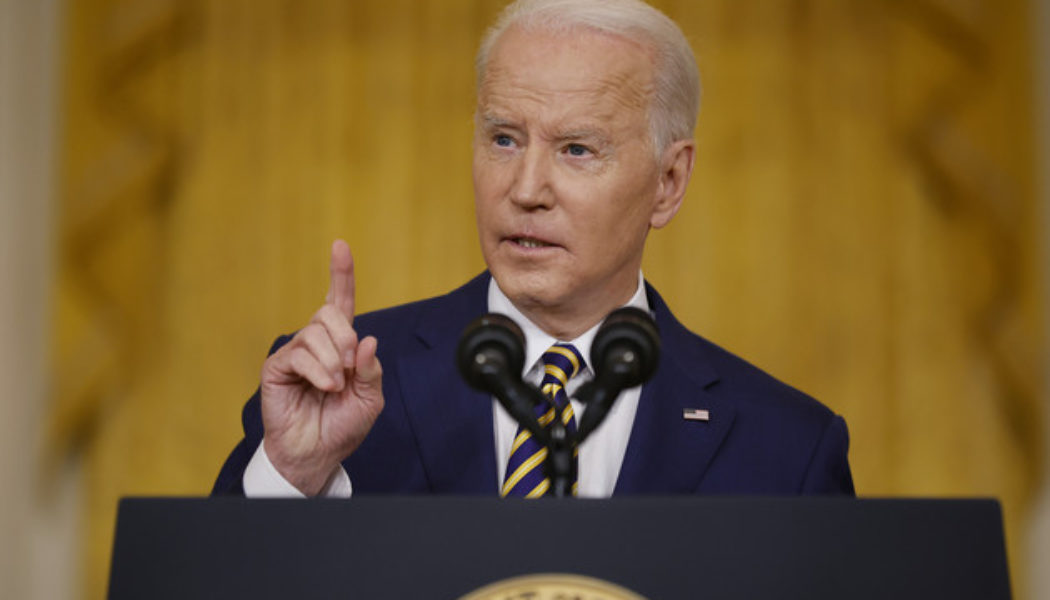“My administration is using every tool at its disposal to protect American families and businesses from rising prices at the gas pump,” Biden said at a press conference Thursday, adding that his newest sanctions were specifically designed to allow Russian energy payments to continue.
Russia is the world’s third largest oil producer and second largest natural gas producer — the U.S. is No. 1 for both — and those fossil fuels contributed 36 percent of Moscow’s budget in 2021, or $119 billion in revenues. Few people doubt that sanctions choking off that flow might alter Putin’s thinking. But those exports have created a mutual dependency between Moscow and many of its customers, particularly in Europe, that would spread the pain far beyond Russia.
Those economic and political factors have meant that even many of the West’s biggest Russia hawks have offered only muted calls to crimp Russian energy shipments, even as its troops close in around the Ukrainian capital, Kyiv.
How important are Russian oil and gas exports?
The U.S. got just 1 percent of its crude oil in 2020, according to government data, but U.S. oil costs closely track the global benchmark prices, which would soar without Russian supplies. Europe is much more directly dependent, buying 40 percent of its natural gas and a quarter of its crude oil from Russia.
Meanwhile, global energy prices have surged during the past year after the pandemic triggered an economic bust-and-boom cycle for oil and gas sector companies: First, the industry was forced into painful financial belt-tightening as demand sagged — but then faced an explosion as a boom in demand left the market short of supply. That’s been particularly harsh in Europe, where the average household can expect to see its gas and electricity bill rise more than a third this year to $2,100 from 2021.
Americans are feeling that pain in their wallets as well. U.S. gasoline prices are up nearly a $1 a gallon from last year, an increase that has given Republicans an opening to pummel Biden and his climate change policies as a threat to voters’ wallets. The White House has been acutely aware of the political and economic risks from its sanctions.
“We’re not going to do anything which causes an unintended disruption to the flow of energy as a global economic recovery is still underway,” Deputy National Security Advisor Daleep Singh said at the White House on Thursday. “This is the one area where Russia has systemic advantage in the global economy.”
One of the biggest differences in targeting Russia compared with Iran, whose economy all but collapsed under U.S. sanctions during the Obama and Trump eras, is simply the immense scale of Russia’s industry. Russia exported 5 million barrels of oil a day in 2020 — about double Iran’s peak exports before the sanctions were re-imposed by the Trump administration — and it also ships 2 million to 3 million barrels a day of refined petroleum products like diesel, jet fuel and gasoline.
Blocking that flow could add $40 to the price of a barrel of the global crude benchmark, which now stands at $98. Such a spike would cause the prices of everything from transportation fuels to food to soar and likely cause civic unrest.
“The U.S. and EU will levy sweeping sanctions but they will not halt Russian energy exports, as that would cause a recession in Europe,” investment research firm BCA Research said in an analyst note. “European political leaders would likely fall from power in the coming years if there were a full-scale energy crisis.”
Instead, the United States and Europe are aiming to choke off Russia’s ability to transition its own economy away from oil and gas — essentially killing its ability to join the next generation of energy production, said Ben Cahill, senior fellow at the energy program of the Center for Strategic and International Studies.
“We are going to stop Russia from diversifying its economy and developing advanced industries, which is mostly about the defense sector, but also potentially hydrogen and its longer-term energy ambitions too,” Cahill said. “It’s less risky than directly going after energy.”
Why doesn’t the United States boost its own oil and gas to replace Russia’s?
The shale boom in the U.S. over the past 15 years has turned the country into the world’s energy powerhouse, and the U.S. energy industry is using the Ukraine crisis to promote its own wares.
“The United States can tilt the balance of power in Europe by increasing liquefied natural gas exports to the continent, helping to reduce our allies’ decades-long dependence on Russian natural gas — and the economic, political, and military vulnerabilities that accompany it,” Anne Bradbury, head of the American Exploration & Production Council, wrote in a Houston Chronicle op-ed on Friday.
Flows of that fuel from U.S. companies to Europe have already jumped since the fall, urged on by the Biden administration, and more importantly, high prices there. But even with those additional cargoes, the EU on Thursday increased the amount of natural gas it bought from Russian company Gazprom, even as Russian troops and planes were invading Ukraine.
But while increasing how much U.S. gas flows to Europe could help offset Russia’s power in the long term, it would come years too late to influence the current situation. Boosting shipments requires not only building more export facilities in the U.S. — projects that take many years and billions of dollars to construct — but also more receiving terminals at Europe’s already congested ports.
U.S. oil production is rebounding fast from the cuts during the first year of the pandemic, adding an average of 630,000 barrels per day last year, and it is expected to grow at least by that amount again this year, according to Reuters energy analyst John Kemp and others. DWS Group, an asset management firm, sees U.S. production growing by 800,000 barrels a day by the end of this year, enough to send the price the of international benchmark Brent crude down significantly.
“American producers have demonstrated they will respond to an international crisis and the price environment,” Mike Sommers, CEO of the American Petroleum Institute, told POLITICO.
But the United States would need to raise its production rate of 12 million barrels a day by nearly 50 percent to replace what’s coming out of Russia, a massive jump. Even if it was possible, it would take years, Republican Sen. Bill Cassidy
of Louisiana concedes.
“The options are limited in the short-term,” said Cassidy, who has been among Biden’s toughest energy critics. “The massive amount of [capital investment] required to develop energy resources cannot be tapped off and on quickly. Everybody wants a solution right now, but you don’t just change on a dime.”
How about doing away with fossil fuels entirely?
Sen. Martin Heinrich
(D-N.M.) told POLITICO that the United States should respond to spiraling energy prices caused by Russia’s attack on Ukraine “by reducing our over dependence on fossil fuel commodities.” That’s a refrain increasingly heard in Europe as well, particularly Germany, whose new government is anxious to reduce consumption of natural gas. Germany also blocked certification of the nearly completed Nord Stream 2 gas pipeline early this week in response to Russia’s attack.
Over the long term, those efforts are likely to be successful, and fossil fuel-poor countries in Europe have been leading in that direction. Driving down the price of oil is perhaps one of the biggest weapons the West can wield against Russia: Some analysts argue that a global oil price collapse in the 1980s devastated the Soviet Union and paved the way for its eventual demise in 1991.
But just like with fossil fuels, ramping up wind, solar or hydrogen energy requires massive investments to develop the raw materials and overcome logistical hurdles, a process that’s underway but will take years. The United States and Europe have made strides in expanding their renewable power sector, but the turbines, solar panels and batteries required to grow further all require lithium and other critical minerals that neither currently mines in great quantities. Getting greater volumes of those minerals will mean either opening up more mining pits here or staying dependent on foreign countries for supply.
In truth, blunting Russia’s edge on energy will require years, and, in Europe, will see different countries opting for different forms of energy, said Pierre Noël, a research scholar at Columbia University’s Center on Global Energy Policy. France will likely continue expanding its nuclear power sector, while others might choose hydrogen or natural gas from countries besides Russia.
“You need to do both but do it strategically and do it over time,” Noël said. “It’s more of a decade-long project than a year-long project.”
Will the desire to target Russian energy grow if the situation in Ukraine deteriorates further?
Few members of Congress, including Republican hawks who decry western dependence on Russian energy, are calling for direct sanctions to cut off Moscow’s oil and gas supply.
Sen. Shelley Moore Capito
(R-W.Va.) is an exception, telling POLITICO that sanctioning Russian energy could be effective, but she still added the caveat that action would have to be done in conjunction with cutting Russia off from U.S. dollar and other foreign currency and debt markets, and removing it from the SWIFT international payments system.
“Without doing those two things and isolating Russia in that way, energy sanctions will equally hurt the economies of the U.S. and our global allies while potentially enriching Moscow,” said Capito, the top Republican of the Environment and Public Works Committee.
Germany and Italy seem to be coming around to other countries’ desire to kick Russia off SWIFT, which would make it harder for Russia to plan financial transactions.
That would increase energy prices in the short term for anyone wanting to buy Russian crude or gas, but those prices would eventually fall as trade routes readjust, said Darwei Kung, commodities head for asset management company DWS Group. In one scenario, Russia sells more of its oil to China, which then frees up cargoes that China otherwise may have purchased elsewhere.
“If they kick Russia off SWIFT, oil will jump up” a few dollars, Kung said in an interview. “It will prohibit the flow of oil. But eventually that flow will unblock itself.”
[flexi-common-toolbar] [flexi-form class=”flexi_form_style” title=”Submit to Flexi” name=”my_form” ajax=”true”][flexi-form-tag type=”post_title” class=”fl-input” title=”Title” value=”” required=”true”][flexi-form-tag type=”category” title=”Select category”][flexi-form-tag type=”tag” title=”Insert tag”][flexi-form-tag type=”article” class=”fl-textarea” title=”Description” ][flexi-form-tag type=”file” title=”Select file” required=”true”][flexi-form-tag type=”submit” name=”submit” value=”Submit Now”] [/flexi-form]









